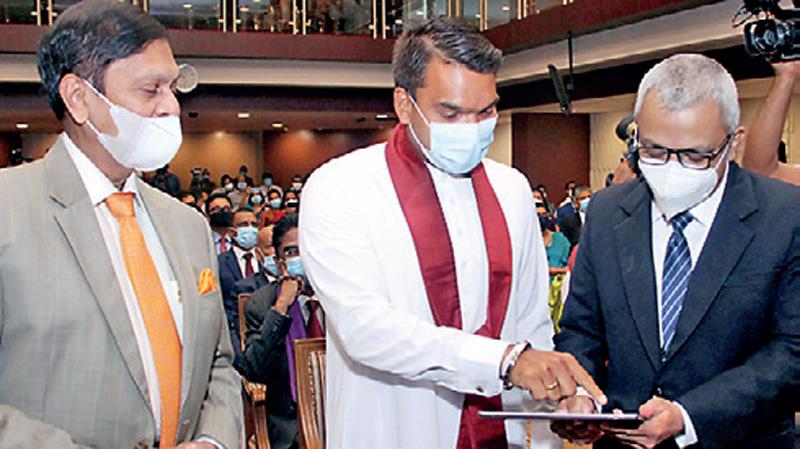09 Feb 2022 - {{hitsCtrl.values.hits}}

Minister of Youth & Sports, Minister of Development Co-ordination and Monitoring and State Minister of Digital Technology and Enterprise Development Namal Rajapaksa (Center) launching the new Lanka National Remittance Mobile App while the Central Bank Governor Ajith Nivard Cabraal (left) looks on. Pic by Pradeep Dilruckshana
By Shabiya Ali Ahlam
Sri Lanka yesterday went a step further to ensure foreign remittances enter the country via authorized channels with the Central Bank making available a mobile application that would allow migrant workers to transfer funds to the country in an easier manner.
As the national economy grapples with the issue of having to deal with a shortage of foreign exchange, the Central Bank of seems to be leaving no stones unturned and the Lanka National Remittance Mobile App is the latest initiative taken in that regard.
The mobile app went from being an idea to being launched within a period of two months, which indicates the importance of the platform for the Central Bank to fetch higher remittances. In October 2021, a working committee was appointed for the same.
The mobile application was developed with assistance from a diverse set of stakeholders, including the Ministry of Finance, Ministry of Foreign Affairs, Sri Lanka Banks’ Association, Sri Lanka Bureau of Foreign Employment and LankaClear (Pvt) Ltd.
“We are now able to respond with the actual status on the ground to the situation that is being confronted by us. When we did see some of the remittances been threatened and alternative methods being adopted. We did see some other agencies taking a share of remittances that are legitimately coming into the country,” the Central Bank Governor Ajith Nivard Cabraal said justifying the need for such a platform at the launch event yesterday.
The authorities expressed confidence in the platform being a step taken towards addressing the low remittance inflow
to the country. In December 2021, foreign remittances to the country witnessed a sharp contraction when compared with the corresponding period in 2020, which prompted the authorities to implement several incentive schemes for migrant workers.
For Sri Lanka, workers’ remittance is the single largest source of foreign income over the last few years.
According to NDB Bank CEO Dimantha Seneviratne, it is observed that informal means of foreign fund transfers are being favoured more than the legal channels, though there are several advantages when remitting funds via the banking system. Some of the key challenges faced by migrant workers in remitting money to Sri Lanka are the lack of proper tracking mechanisms and the high cost of transfer, shared Seneviratne.
He pointed out that for the new initiative to be successful, efforts must be taken to get as many exchange houses linked to the application.
In 2021, earnings from remittances dipped by 23 percent when compared with the corresponding period in 2020, falling to US$ 5.5 billion from US$ 7.1 billion.
For the 2001 -2020 period, remittances accounted for 8 percent of the country’s total Gross Domestic Product (GDP).
16 Nov 2024 10 minute ago
16 Nov 2024 42 minute ago
15 Nov 2024 15 Nov 2024
15 Nov 2024 15 Nov 2024
15 Nov 2024 15 Nov 2024